attention expats in Canoa
Please let us hear from any expats in the Canoa area---we would really love to chat with you...we are preparing to move from USA very soon & would appreciate some counsel-advice-knowledge-etc on various topics...Thanks !
Hi Tlc,
Too bad no one ever replied to this post, because I would also like to know more about Canoa. I'm not yet in Ecuador, but I'm trying to decide on which area to go to. We're considering Salinas and Cuenca, but also Canoa. Anything you don't like about Salinas that makes you want to relocate? I'd like to have some feedback about any area on the coast... We are two families looking at relocating (one family is already in Quito). We have kids 11-13, so lots of activities for kids and safety are important, and so is high speed Internet. I also read that a group of American expats opened a bilingual school in Canoa, so if anyone have any info on that, that would be great. Or on any other good school in English or French (other than Condamine) that isn't so expensive as to offset all the savings we'll enjoy from moving to Ecuador.
Hi Frenchy!
Thanks for the note. We have now been in Ecuador for 1 year and 9 months.
We started off living in a small town called Puerto Cayo. We stayed there until Jan of this year [2013.] It is somewhat like Canoa in that it is small and not much to do. Shopping was a bit of a pain as we had to travel an hour or so [one way] to get groceries, etc. There was absolutely nothing to do in that small town - so we moved.
We are now in the Salinas area and like it MUCH better!! Shopping is easy and convenient. There is more to do and people to do things with. We had however - hoped that the weather would be more sunny but it appears that the coast of Ecuador only has 5 sunny months [Jan-May or so.] The rest of the months are cloudy. Go figure? Even Canoa has this issue.
If we could breath the air in Cuenca we would consider trying Cuenca. The elevation casues us issues and therefore it is not even an option for us. If high altitudes do not cause you or your family any issues then by all means consider Cuenca. It is beautiful and there are lots of expats there.
As far as safety goes - the larger cities will always have more crime. In the USA or Canada too. However - we find the people here to be very gentle and kind.
Quito doesn't seem to do anything for us. We do not like it anywhere near as much as Cuenca. However - we HIGHLY recommend renting for a year in the area that you "think" you want to live in BEFORE purchasing anything. Properties here do not turn quickly and you don't want to end up living somewhere that you don't enjoy.
To sum it all up - we are glad we did NOT purchase where we "thought" we would like to live. And, we would have not known this had we not rented for a year.
We highly recommend Ecuador. It is a beautiful country with beautiful hard working people. We wish you and your family all of the best in your new venture.
Frenchy:
As Tic has pointed out, a lot depends on what kind of a life style you are looking for.
I have lived in Canoa for a year and a half now and I love it. I do not know much about Salinas or Cuenca, other than from a few visits. Tic is correct about the thin air in Cuenca, aside from that I found the city beautiful, cold, damp, and overrun with expats. Both Cuenca and Salinas are more modern and convenient than Canoa. Including available housing, markets and restaurants.
Canoa is a sleepy little beach town, with sand roads, Surfer guys and gals, a long wide beach to frolic on, kite surfing, sea kayaking, paragliding, and more. Canoa is also a huge back packers destination so there are always people of all ages and from all over the world to meet and talk with. There are dozens of little markets that allow you to find most of the staple goods you could need. If you are looking for more North American type products and are unable to adjust to fresh sea food, fresh natural produce, or just want a bigger selection you just travel 30 minutes South by bus (50 cents) to San Vincente to the big open air market, or for more foods you might be accustomed to check out a market called Mi Comasariato. San Vincente is also the closest ATM to Canoa. On the off chance you cant find what you want there is Bahia, just across the bridge from San Vincente.
Yes some might get bored in Canoa. However it has been my observation that most find it difficult to leave the stress free tranquility of this beach town. With a half dozen restaurants that cater to the expat food preferences. In addition you have Dozens of restaurants for more local cuisine, and several beach front bungalow bars to sit and watch the sunset and surf while enjoying a fresh fruit smoothie or your favorite cocktail it is easy to see why this town is so captivating. Canoa Beach is the top pick for Quitonians to come on their vacation.
Canoa does have a bilingual school. It is a small private school conceived and created by a friend originally from the States. He wanted to provide the local kids a chance to learn English along with keeping up with the normal mandated courses. I know a few native English speaking kids that go here and are thriving. I also know a couple that moved here with their 5 children ranging in age from early twenties down to nine and their 1 grandchild. All are happy and well adjusted. The thirteen year old can be seen out surfing every afternoon after classes.
I hope this information is helpful. I too would recommend renting and trying it on for size. Maybe rent in a town that you can use as a base camp and traveling to the other locations to check them out.
If you have any more questions please let me know.
And PLEASE DONT tell to many people about Canoa. Those of us here fear it getting too big to fast. We all like our sleepy little beach paradise just the way it is.
Leonard
I thought the altitude was only an issue in Quito... I will have to see how it affects me. I have motion sickness. Not sure about height. Thanks.
Thanks, it is very helpful... I will stop by in December, but the 30 min bus ride to the ATM might be an issue for me (or maybe it would teach me better money management skills lol). Do you happen to know the name of the school? I'd like to find out about tuitions.
Hi tlc, and worleyld, just want to express my appreciation for taking the time to write these briefs; great to read; nice detail, very helpful.
Thanks!
James
PS on Canoa secrecy: mums the word 
Frenchy:
The school in Canoa is called La Escuela Los Algarrobos.
You can find some information and contacts here at;
http://www. gofundme.com/41dycw
Here is a link to a short video to give you a little glimps of Canoa;
http://www. youtube.com/watch?v=TMxqp2kyQNs
I hope this helps
Leonard
This is one of the towns I had looked at when I started my research back in March. Not much info was available.Thanks for very helpful and detailed description. What is the rental situation- availability and cost. I don't need anything fancy. I live in a city now (and have lived in small villages too) and the idea of living in a sleepy little fishing village with interesting people coming and going sounds quite appealing.There are modest rentals in Bahia but it is starting to sound like too much of a city. Transportation back and forth doesn't seem to be a problem Anyway can't really make any decisions till I get there. Still have some loose ends to tie up
Sue
Sue:
When I first hit town I stayed at a hostel for two weeks. This gave me a chance to get to know the area and the residents. I immediately started inquiring about rentals and looked at everything I could find.
There are rentals here in Canoa. Depending on what you are looking for in size, amenities and location will greatly affect the cost. Hot water for your shower is not a norm in the lower priced places, but can be fitted with a shower head water heater. You can find places ranging from $150 to $450 per month. The nicer places will want a first and last months rent to move in. They will ask how long you intend to stay and may ask for a 6 or 12 month lease. However those that want a lease are in the minority and usually can be talked out of it. Most are very happy to have retired ex-pats renting their places as we are seen as much more stable and having the funds to pay the rent each month.
The place I rent now (the fourth place since I hit town) is great. I pay $200 a month. I am 6 blocks off the beach on the third floor of a building that sits on a slight hill. My bedroom window looks west over the main part of town and on to the ocean. During the hot weather, I get a great unobstructed cooling breeze off the water. I have a small kitchen with refrigerator and cook top. No oven, but that could easily be added if I was so inclined. The building is located back in the old barrio neighborhood surrounded by the locals. This has afforded me great security as I have made friends with most of the Canoa locals. Living in the barrio I am not seen as just passing through and not a Gringo isolationist afraid of the locals. Both just passing through and isolationism can make you a target to the local bad boys. Being part of their community earns you a bit of respect and will afford you many new friends and adopted families.
With the correct mindset you will find it easy to fall into the rhythm of life here in this sleepy little village. You will soon learn the fishermans schedules and when to go down to the beach to buy straight off the boat. You will learn when the several fruit and vegetable trucks come through town and the specialty crop of each. You will learn about the festivals, parties, and other happenings. For a sleepy little town there is almost always something going on if you wish to participate, as a local you will be welcome. You will learn of and from an eclectic mix of expats of all ages that have settled in Canoa. There are long term residence from Alaska, eastern and western Canada, several parts of the States, England, Croatia, France, Spain, Germany, etc
As well as get to interact with back packers of all ages from every corner of the globe.
I hope some of this was helpful. If you have any more questions about Canoa and the surrounding area, please dont hesitate to ask.
Leonard
Leonard, I am curious if you speak Spanish and impact it had on your assimilation.
Fdmcg:
My Spanish is very poor at best. If it is spoken slowly and without colloquial slang phrases, I can follow most conversations. Unfortunately due to a brain injury it is hard to formulate a response, and even harder to get my mouth to work with the words. I get by with simple 3 word sentences and responses. The first day in town I was at a tienda and for the life of me could not remember the words for sliced bread. After what seemed like an eternity of charades I was informed that what I wanted was Su Pan, a brand name. A lot of the items here are known by the brand name, as in Mama Fany for Flower Tortillas.
The impact of my lack of Spanish on my assimilation was minimal. The people here are for the most part very friendly and accommodating. They have become accustomed to the many travelers and back packers with little to no Spanish abilities. If you make an attempt to try it in even the clumsiest of Spanish they see it as a mark of your respect to them and their culture. A lot has to do with your overall approach and demeanor. If you come across as The loud, arrogant, UGLY Gringo then you will be treated as such. However if you are a genuinely open person that shows respect and humility, you will be welcomed with open arms, a big smile and they will bend over backwards to try and help. The fact that after just a few months almost everyone in town knew me and would wave and say high is a testament to that.
Leonard
Hi Leonard-
Sounds better and better to me. I guess the only amenity essential for me is hot and cold running water and a shower,place to cook and some furniture. Nothing fancy. Maybe there is nice local stuff.
I have a degree in foreign language (French/Russian) and I am a culture/language nut and with my steady retirement income hope to do more travelling if I can live on the cheap. Am studying my Latin American Spanish book and should be good enough when I get there even to deal with the visa bureaucrats if I decide to stay
The only worrisome thing is when you talk about the "barrio" How safe would I be there? Are there safer locations for a single woman? Latin American men(and I don't mean to paint them with a broad brush) are not as "modern" shall we say in respect for women. Although the new super sensitive politically correct guys are not really my type either!!!
Would the local women watch out for me once I got to know them and was accepted. Speaking the language even badly would help that process I'm sure
I guess I can deal with it but don't want to feel unsafe. The guy who does my yard is Mexican and though we are amigos he pretty much keeps his hand off me after six years of knowing him. I guess being friendly, which I am, is often misinterpreted and he is helping me practice my Spanish.
Thanks again for good info
Sue
suefrankdahl wrote:I guess I can deal with it but don't want to feel unsafe. The guy who does my yard is Mexican and though we are amigos he pretty much keeps his hand off me after six years of knowing him. I guess being friendly, which I am, is often misinterpreted and he is helping me practice my Spanish.
Sue
In my humble estimation, Spanish is more standardized than English--but Mexican Spanish isn't going to do you a whole lot of good in Ecuador. South American Spanish is kilometers different than Mexican and central American Spanish.
It never hurts though. Some Spanish is better than no Spanish.
I don't know about the universal meaning of 'barrios', to north Americans this connotes corrugated tin and cardboard slums. In Ecuador we saw various 'barrios' on city signs identifying neighborhoods, most of them rather lacking in amenities but neighborhoods nonetheless. Certainly nothing akin to Brazilian favellas or what we think of when Cuidad Juarez barrios come to mind.
Have you been to south America? You really should give it a try before attempting to decipher what 'safe' is and what you consider a 'barrio' and what it means to 'speak Spanish'.
worleyld wrote:My Spanish is very poor at best. If it is spoken slowly and without colloquial slang phrases, I can follow most conversations. Unfortunately due to a brain injury it is hard to formulate a response, and even harder to get my mouth to work with the words.
However if you are a genuinely open person that shows respect and humility, you will be welcomed with open arms, a big smile and they will bend over backwards to try and help. The fact that after just a few months almost everyone in town knew me and would wave and say high is a testament to that.
Leonard
Leonard, I applaud your acceptance of learning Spanish as an integral part of assimilating into the local culture. It is not easy.
gardener1 wrote:...In my humble estimation, Spanish is more standardized than English...
I totally disagree. Just travelling around Ecuador, it's not hard to find places where my Ecuadorian gf can't understand the local people. Spanish is blended with so many indigenous languages in different countries. The Spanglish I learned in the USA is no use in areas that are a mix of Quechuan and Spanish or Awa pit and Spanish. I was trying to order "jugo" in a restaurant in la Merced de Buenos Aires last week. It's a word I use enough that I never have any trouble with it. My pronunciation is spot on, but the people in the restaurant had no idea what I was saying. Eventually, another patron assisted me by translating from Spanish to Spanish. Even in Spain, it was the same, there were areas where the Spanish was halfway mixed with Catalan or Basque.
Sue, Priviet:
Sorry to instill any fears by false imaging. My use of the term Barrio serves only to designate the part of town where most of the locals live. Do not think of it as it is used in the inner cities of North America and Europe. Yes there are parts of any town where the undesirable elements reside, but here in the barrio the families tend to look out for each other and push those bad elements back to their areas. Here we have 2 schools, a couple football fields, a skate board park, a medical clinic and the church.
Yes there are several areas in town, each with their own feel. It is best for you to visit each and find what feel comfortable to you.
You are correct in that the men here are more machismo than modern in their view of women, but it is mostly harmless whistling and this strange sound they use that is like a tire loosing air. The men if they chose to have a mistress go for the 25 year olds. The younger surfer dudes zero in on and flock around the 18-30 year old female back packers. Families and family values are very strong here, and as such any action beyond the cat calls is shunned. Yes indeed the local women would look out for you, and being a small town word would be quickly spread that you are not interested and do not appreciate any advances. I have known a few single women at or nearing retirement age that complained of the lack of age appropriate, educated, cultured men in the area. Most expats come here as a couple. There are a hand full of us that are here as singles and as such we tend to watch out for each other, weather male or female. All in all I think you would be safe and well looked after by locals and expats alike.
Leonard
Thanks Leonard
That's very reassuring. Wish I was closer to getting out of here. But in the meantime just keep reading and getting to know people.
In two weeks we lose an hour of daylight.Clocks go back an hour. It's hard to get out of bed when it's still dark or gray skies.
Sue
Never been to South America that's why I want to check it out. Have done some extended stays in third world places. I'm sure the poverty is terrible among indigenous people and there are horrible slums in the big cities. Are they worse than pictures I've seen of Brazil? At least on the coast there are fresh fish and fruits/vegetables so no one is starving. Safety for me is knowing where not to be and when not to be there Keeping your wits about you wherever you are is SOP for me.I have pretty good instincts and maybe with other ex-pats' help it won't take so long to get oriented. As far as Spanish where else can I start but with a Latin American Spanish book other than actually being there? For me "barrios" were Puerto Rican ghettos in NYC. I am sure things have improved there after all these years.
suefrankdahl wrote:As far as Spanish where else can I start but with a Latin American Spanish book other than actually being there? For me "barrios" were Puerto Rican ghettos in NYC. .
Sue, I agree with Leonard that "barrios" refers more to a "neighborhood" vs a slum. It is an economically neutral term. I have never seen slums in Ecuador that compare in size to Brazil or Venezuela.
In addition to a Spanish book, I suggest watching Spanish language TV shows, especially soap operas. After a while you pick up common phrases and expressions. (my wife learned English watching cartoons while babysitting a nephew.) The biggest hurdle learning a second language is having sufficient self confidence to speak words that sound strange to you and accept you will make mistakes. It is humbling however as Leonard points out, the effort will endear you to the locals.
Sue,
I agree with the above post... I just wanted to add that listening to soap operas or cartoons is really important because even if you don't understand... your brain is learning the sounds and separating words. Whereas at first they just seem to run together.
I found this with Arabic.
Judy
Both are great ideas. I don't watch much TV but am sure there are Spanish language radio stations. I'll try it. I have lots of people to practice with here.
Muchas gracias,
Sue
suefrankdahl wrote:Both are great ideas. I don't watch much TV but am sure there are Spanish language radio stations. I'll try it. I have lots of people to practice with here.
Muchas gracias,
Sue
Youtube will have pretty much anything you need in Spanish (songs, shows, cartoons, lessons, and so on.)
Also bought a program from this company, not Spanish, but it's been very helpful. Is marketed for children. However have found the simplicity of it to work well (at least for me).
dinolingo.com/
I would love to hear more about Canoa. How is the weather? Is there stable internet? Anything you could share.
Thanks
All right, Sea Turtles Sevens, you asked for it.
Here are some things I learned today about Canoa from the folks at South America Living:
-- You can attend espanol classes right on the beach, courtesy of Canoa Spanish Language School.
-- Canoa is a great place to learn to surf: waves year round and a sandy shallow bottom. Intermediate surfers will like the November-April period when waves are more consistent and challenging.
-- Apartments are available for about $200, and for $300 (and up) you can rent a fully-equipped unit at a modern complex in town geared for wealthier retirees.
-- There is little shopping in Canoa besides the usual "pulperias." Expats typically travel 25 minutes to San Vicente to find shopping with a wider selection.
-- There is a downside for some Expats headed to Canoa: the young party vibe, accompanied by alcohol and drugs, may be a turn-off for some folks.
(southamericaliving.com)
We're giving Canoa a second look. I spent a few weeks here 2 years ago, and loved it, but couldn't justify the real estate prices. This time through we found a hilltop lot 1km from town with a perfect view. It's a little steep, but with a bit of dirt work it should be fine. The seller thinks it's 500 sq meters, but the municipality informed us that it's actually 640 meters. Asking price 12000. And so, we're debating making our 3rd Ecuador real estate purchase.
jessekimmerling wrote:We're giving Canoa a second look. I spent a few weeks here 2 years ago, and loved it, but couldn't justify the real estate prices. This time through we found a hilltop lot 1km from town with a perfect view. It's a little steep, but with a bit of dirt work it should be fine. The seller thinks it's 500 sq meters, but the municipality informed us that it's actually 640 meters. Asking price 12000. And so, we're debating making our 3rd Ecuador real estate purchase.
Congratulations! The author of the attached review of Ecuador beaches - which almost always lines up with "prevailing views" on this forum - agains seems to agree with the comments you and cccmedia have expressed. The beer sign shown on the view of Main Street attracts me like a moth to light!
http://ecuadorbeaches.org/beaches/manab … noa-beach/
Hello everyone. My girlfriend and I are considering a move to Ecuador within 2 years, so we are starting to gather as much info as possible. We are certainly interested in what we have seen about Canoa. Found this thread very helpful, as it is not always easy to get a real idea of what life as an expat would be from tourist sites and travel books, etc.
We have a ton of questions, but I will start with a few here:
1. Vehicle: We have learned that purchasing a vehicle in Ecuador can be extremely difficult (expensive).And it seems that importing a vehicle is also prohibitive as they only allow newer vehicles to be brought in, and they charge something like a 40% tax! I am curious about any comments you may have about owning a vehicle down there. Does anyone down there "share" vehicles? It would seem like one would not need a vehicle that often, so buying it in some kind of a coop situation may work, but of course I am sure that causes lots of insurance issues, etc.
2. Work: We are not exactly retired (in our 50's and 40's) and would need to have some way of making a living. Obviously Canoa is a very small town, so what if any employment opportunities can be found there?
3. Weather: We keep reading about how the weather during the off season can be challenging, i.e. Rain and overcast almost everyday. Any comments on that?
Thank you all in advance.
skashanchi wrote:1. Vehicle: We have learned that purchasing a vehicle in Ecuador can be extremely difficult (expensive).And it seems that importing a vehicle is also prohibitive as they only allow newer vehicles to be brought in, and they charge something like a 40% tax ! I am curious about any comments you may have about owning a vehicle down there. Does anyone down there "share" vehicles?
Welcome to the Ecuador forum, Skashanchi.
There is a lot of information on the Car Lovers and Car Maintenance threads.
I just priced and test-drove one of the most popular models in Quito -- the Chevy Sail. It´s a small car developed for sale in India originally, and now available in much of Ecuador and Peru, including the coastal regions.
The list price for a new Sail is about $18,000. At the Autolandia Chevrolet dealership in Quito, where I did the test drive, the Sail was available only with a stick shift. I was told that new Chevys there with automatic transmission were available starting above 30K. Stick shift is overwhelmingly common in Ecuador.
To get an idea of listings for new cars -- many of which are priced under 10K -- visit one of the car-sale sites for Ecuador such as www.patiotuerca.com ... Buying cars that have a history of being driven near the coast is usually not recommended as the salt air causes problems over time.
Bring your state-certified and apostilled driving record to Ecuador if moving here, to save yourselves the time and expense of obtaining such U.S. documents from here. A canje or exchange of your Colorado license is possible if you bring the driving record. Other requirements including off-road tests do apply.
Car-sharing has been catching on in Cuenca and lately in Quito .. but I haven't seen any reports of it on the coast.
To reach relevant threads on this forum, type Car Lovers or Car Maintenance and Repair into the search box atop this page .. and then click on the search icon to the right of the box.
cccmedia in Quito
skashanchi wrote:2. Work: We are not exactly retired (in our 50's and 40's) and would need to have some way of making a living. Obviously Canoa is a very small town, so what if any employment opportunities can be found there?
Gringos with limited Spanish skills face a montón of obstacles, especially in a small coastal town such as Canoa.
Ecuador is welcoming retirees with investment money these days. Working-age Expats, not so much.
The locals have the inside track on all jobs for which they are competent.
Gringos who assist other Gringos -- with residency visas or real estate, as examples -- have had some success, but usually in a place such as Cuenca with a sizable Gringo community.
cccmedia in Quito
skashanchi wrote:3. Weather: We keep reading about how the weather during the off season can be challenging, i.e. Rain and overcast almost everyday. Any comments on that?
The coast has many micro-climates. The cooler, rainier, overcast weather you learned about can be common during June to November.
The budget-friendly, touristy town of Salinas has packed beaches during high season, but sparse numbers of visitors during the cooler off-season months.
This year El Niño is predicted to peak around December .. and is a major weather concern. The El Niño 2015 thread has more details.
cccmedia in Quito
I clicked on the link to the school in Canoa. Maybe there is an updated one to view.
We've lived in Ecuador for 4 years and want to live near the coast, wondering if there are many expat families in the area?
Anyone know about private schools in Canoa? Organic Produce? I'd like to find likeminded green thumbs around the area.
Make your relocation easier with the Ecuador expat guide
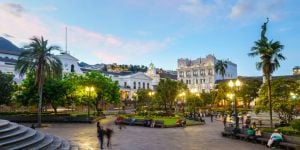
Work in Ecuador
Ecuador is famous as a retirement haven. But you might not want to wait until retirement age to move there and ...

Healthcare in Ecuador
Ecuador, as a fast-developing nation, has laws that are constantly evolving, but one thing is certain: the ongoing ...

Food in Ecuador
What kind of food will you find in restaurants, cafes, and private homes in Ecuador? Many restaurants in Ecuador ...

Leisure activities in Ecuador
You have made it to Ecuador, now what is there to do in your free time? A lifetime in Ecuador isn't enough time to ...
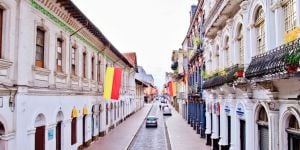
Work in Cuenca
There is no doubt that the Spanish colonial city of Cuenca is a wonderful place to call home, as demonstrated by ...
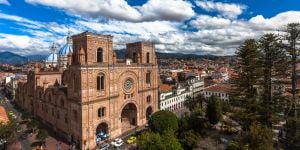
Accommodation in Cuenca
The rose-colored lenses through which potential expats have been made to view Cuenca often blur how the real ...
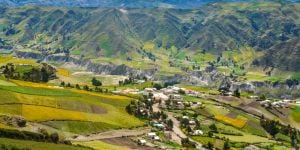
Family and children in Ecuador
Family is everything to an Ecuadorian. The extended family unit is the most important aspect of life in Ecuador, ...
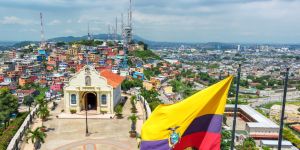
Setting up a business in Ecuador
Forum topics on networking in Ecuador



